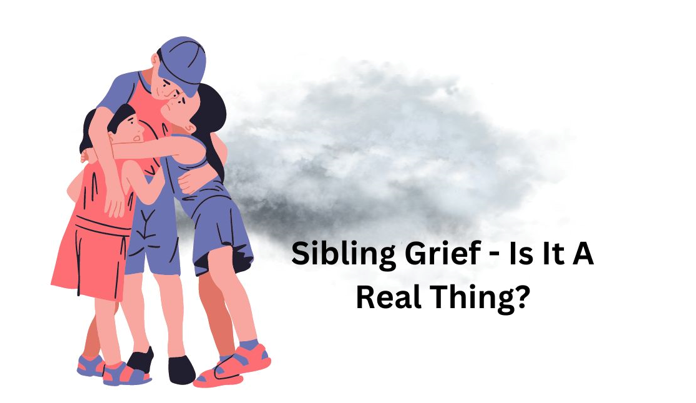Sibling Grief – Is It A Real Thing?
Understanding Sibling Grief
Unlike other types of grief, siblings’ grief is often characterized by exceptional complexity and a distinct emotional landscape. The shared history and bond between siblings is what separates sibling grief from other types of grief. Brothers and sisters, due to the nature of their dynamic, typically grow up together, sharing countless experiences and forming deep emotional connections. The loss of a sibling thus often feels like losing a part of oneself, as it disrupts the continuity of shared memories and future plans. It also shifts the attention of the parents from the dynamic of the siblings to the dynamic of the only child, placing added responsibility and pressure on the remaining siblings to fill the gap.
Impact of Sibling Loss
From childhood, siblings are often each other’s first companions, forming bonds of trust, loyalty, and shared experiences. This deep connection shapes their development, as they share not only familial ties but also a lifetime of memories. The loss of a sibling can be especially difficult because it severs a shared history and a unique witness to one’s life, leaving the surviving sibling feeling isolated in their grief.
The future is also disrupted, as siblings typically envision sharing life’s milestones together. This absence alters future moments and deepens the sense of loss. Compounding the grief, parents’ mourning may overshadow the emotional needs of surviving siblings, leading them to suppress their own grief to avoid adding to their parents’ burden. Society also often underestimates the impact of sibling loss, offering less support compared to other family deaths, leaving survivors feeling invalidated.
Survivor’s guilt is common, with siblings questioning why they survived and struggling with guilt or pressure to live up to their deceased sibling’s memory. Ultimately, the emotional toll of losing a sibling is profound, encompassing a range of emotions and potentially leading to long-term psychological effects.
Emotional, Psychological, and Behavioral Impact
- Initially, sadness is a pervasive emotion. This sadness stems from the loss of a cherished relationship and the sudden void left in the sibling’s life. The bereaved sibling mourns not only the loss of their brother or sister but also the shared experiences and future plans that will never come to fruition. This sorrow can be deeply felt and may persist for an extended period, coloring their daily experiences and interactions.
- Anger is another common emotional response. Siblings may feel anger towards the circumstances that led to the death, towards medical professionals if they believe more could have been done, or even towards the deceased sibling for leaving them behind.
- Guilt often accompanies sibling grief, Survivor’s guilt with the surviving sibling questioning why they lived while their sibling did not. They may also feel guilt over past arguments or not having spent enough time with their sibling. This guilt can be a heavy emotional burden, hindering the healing process and leading to self-blame and feelings of inadequacy.
- Confusion is another emotional state that bereaved siblings might experience. The sudden loss disrupts their sense of normalcy and stability, leading to a feeling of disorientation. They may struggle to understand their emotions and the reality of their sibling’s death, making it challenging to process their grief effectively.
- The potential for complicated grief is significant in sibling loss. Complicated grief occurs when the grieving process is prolonged and intense, interfering with the individual’s ability to function in daily life. The depth of the sibling bond and the unique dynamics involved can exacerbate this condition, leading to chronic grief that may require professional intervention.
- Long-term emotional effects of sibling grief can include depression and anxiety. The sadness and loss can evolve into major depressive disorder, characterized by persistent low mood, lack of interest in activities, and feelings of hopelessness. Anxiety may also arise, fueled by fears of losing other loved ones or heightened concern over their own mortality. Trauma is another potential consequence, especially if the sibling’s death was sudden or violent. This can lead to symptoms of post-traumatic stress disorder (PTSD), including flashbacks, hypervigilance, and emotional numbness.
- There can be a wide range of behavioral reactions to the loss of siblings. Withdrawal is a common response, where the grieving sibling retreats from social interactions and activities they once enjoyed. This isolation can exacerbate feelings of loneliness and depression. There are also academic issues, as emotional turmoil can affect concentration, motivation, and performance in school. Acting out is another potential behavioral change, where the sibling may engage in risky behaviors or exhibit aggression as a way to express their unresolved emotions and cope with their grief.
How Can One Cope with Sibling Grief?
While navigating through sibling grief requires a toolbox filled with healthy coping mechanisms that offer solace and support.
- The promotion of open communication among family units with regard to the deceased sibling can be a crucial strategy. A safe space for healing can be created by encouraging siblings to share memories, emotions, and reflections of their lost loved one. This open dialogue not only honors the memory of the deceased but also allows siblings to express their grief in a supportive environment.
- Another powerful coping mechanism for grieving siblings is to take part in remembrance activities. A sense of connection and continuity can be provided by establishing rituals or traditions to remember the life of a deceased sister. These activities serve as a meaningful reminder of the enduring bond between siblings, whether it’s planting a tree in their honor, participating in charity events, or marking one day each year to celebrate their life.
- Seeking professional support is essential for siblings navigating the complexities of grief. Mental health care in India offers a range of services tailored to meet the needs of grieving individuals.
- From counseling and therapy to support groups and workshops, there are various resources available to help siblings process their emotions and develop healthy coping strategies. By reaching out to a psychiatrist near you, grieving siblings can access the support and guidance they need to navigate their grief journey with resilience and strength. Platforms like Mpower, and many more try to make mental health accessible to individuals in need.
- In order to comfort and reassure grieving siblings, it is important to establish an environment of family support. In a family unit, emotions should be recognized and understood so that siblings can feel listened to as they cope with their loss.
- Furthermore, incorporating self-care practices into daily life can help siblings manage their grief more effectively. Engaging in activities that promote physical and emotional well-being
Conclusion
In conclusion, coping with the loss of a sibling is undoubtedly a difficult journey that demands patience, empathy, and assistance. By promoting open dialogue, participating in meaningful memorial activities, seeking professional help, cultivating a nurturing family environment, and prioritizing self-care, grieving siblings can confront their grief with resilience and fortitude. India’s mental health services furnish invaluable resources and aid for those grappling with bereavement, while connecting with a nearby psychiatrist can offer personalized guidance and support throughout the healing process.



